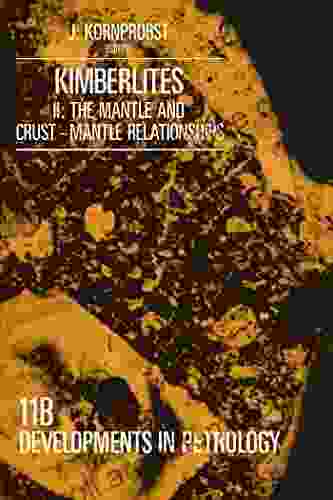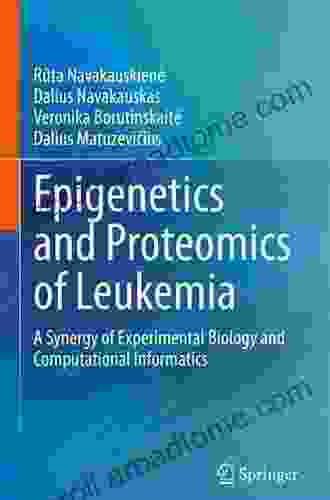Epigenetics and Proteomics of Leukemia: Unveiling the Molecular Basis of a Devastating Disease

Leukemia, a cancer of the blood-forming tissues, poses a significant threat to human health worldwide. The advent of modern molecular biology techniques, particularly epigenetics and proteomics, has revolutionized our understanding of leukemia pathogenesis and opened up new avenues for therapeutic intervention.
4.7 out of 5
| Language | : | English |
| File size | : | 79525 KB |
| Text-to-Speech | : | Enabled |
| Enhanced typesetting | : | Enabled |
| X-Ray for textbooks | : | Enabled |
| Print length | : | 714 pages |
| Screen Reader | : | Supported |
Epigenetics in Leukemia
Epigenetics refers to heritable changes in gene expression that do not involve alterations in DNA sequence. These changes, such as DNA methylation, histone modifications, and non-coding RNA expression, can profoundly impact gene function and contribute to the development and progression of leukemia.
- DNA Methylation: Aberrant DNA methylation patterns are a hallmark of leukemia. Hypermethylation of tumor suppressor genes leads to their silencing, while hypomethylation of oncogenes promotes their activation.
- Histone Modifications: Dysregulation of histone modifications, including acetylation, methylation, and phosphorylation, can alter chromatin structure and influence gene expression. Specific histone modifications are associated with different leukemia subtypes.
- Non-coding RNAs: Non-coding RNAs, such as microRNAs and long non-coding RNAs, play crucial roles in regulating gene expression. Their aberrant expression can promote leukemia progression by targeting key genes.
Proteomics in Leukemia
Proteomics encompasses the study of protein expression, structure, and function within cells. In leukemia, proteomic analysis has identified alterations in protein expression profiles that contribute to disease development and progression.
- Oncoproteins: Overexpression of oncoproteins, such as BCR-ABL, FLT3, and NPM1, drives the development and maintenance of leukemia. Understanding their molecular mechanisms can lead to the development of targeted therapies.
- Tumor Suppressor Proteins: Inactivation of tumor suppressor proteins, such as p53 and PTEN, through mutations or proteolysis, promotes leukemia progression by allowing uncontrolled cell proliferation.
- Proteomic Signatures: Proteomics techniques have identified unique protein expression signatures that distinguish different leukemia subtypes and predict patient outcome.
Epigenetics and Proteomics in Leukemia Diagnosis and Prognosis
Epigenetic and proteomic markers have emerged as valuable tools for leukemia diagnosis, classification, and prognosis. By analyzing specific epigenetic patterns or protein expression profiles, clinicians can:
- Identify different leukemia subtypes with distinct clinical features and treatment responses.
- Assess the risk of relapse and predict patient outcome.
- Monitor disease progression and evaluate response to therapy.
For example, the methylation status of specific genes, such as HOXA9 and PRAME, can distinguish acute myeloid leukemia from other blood cancers and predict treatment outcomes.
Epigenetics and Proteomics in Leukemia Therapy
The understanding of epigenetic and proteomic mechanisms in leukemia has paved the way for the development of targeted therapies that modify disease-driving molecular alterations.
- Epigenetic Therapies: Drugs that target epigenetic modifications, such as DNA methyltransferase inhibitors and histone deacetylase inhibitors, have shown promising results in leukemia treatment. These drugs can restore normal gene expression patterns and induce tumor regression.
- Protease Inhibitors: Proteasomes play a critical role in protein degradation. Protease inhibitors, such as bortezomib, inhibit proteasome function and lead to the accumulation of specific proteins, including tumor suppressor proteins, resulting in anti-leukemic effects.
- Targeted Protein Therapies: The development of monoclonal antibodies and small molecule inhibitors that specifically target oncoproteins or key signaling molecules has revolutionized leukemia therapy. These targeted therapies block the oncogenic functions of these proteins and induce cell death.
Combinations of epigenetic and proteomic therapies are being explored to enhance therapeutic efficacy and overcome resistance.
Future Directions and
The field of epigenetics and proteomics in leukemia is rapidly evolving, with new discoveries constantly emerging. Future research directions include:
- Developing more specific and potent epigenetic and proteomic therapies.
- Identifying novel biomarkers for early diagnosis and monitoring of leukemia.
- Understanding the interplay between epigenetic and proteomic alterations and their impact on leukemia heterogeneity and drug resistance.
By unraveling the complex epigenetic and proteomic landscape of leukemia, we can gain a deeper understanding of this devastating disease and pave the way for more effective and personalized treatments.
Reference List
- Dawson MA, Kouzarides T. Cancer epigenetics: from mechanism to therapy. Cell. 2012;150(1):12-27.
- Ferreira P, Boultwood J, Lameiras S. Proteomics in leukemia: from diagnostics to targeted therapy. International journal of molecular sciences. 2018;19(6):1706.
- Schnell S, Techlenburg G, Strickler HD. Epigenetic and Proteomic Alterations in Leukemia. Seminars in cancer biology. 2019;57:25-36.
4.7 out of 5
| Language | : | English |
| File size | : | 79525 KB |
| Text-to-Speech | : | Enabled |
| Enhanced typesetting | : | Enabled |
| X-Ray for textbooks | : | Enabled |
| Print length | : | 714 pages |
| Screen Reader | : | Supported |
Do you want to contribute by writing guest posts on this blog?
Please contact us and send us a resume of previous articles that you have written.
 Book
Book Novel
Novel Page
Page Chapter
Chapter Text
Text Story
Story Genre
Genre Reader
Reader Library
Library Paperback
Paperback E-book
E-book Magazine
Magazine Newspaper
Newspaper Paragraph
Paragraph Sentence
Sentence Bookmark
Bookmark Shelf
Shelf Glossary
Glossary Bibliography
Bibliography Foreword
Foreword Preface
Preface Synopsis
Synopsis Annotation
Annotation Footnote
Footnote Manuscript
Manuscript Scroll
Scroll Codex
Codex Tome
Tome Bestseller
Bestseller Classics
Classics Library card
Library card Narrative
Narrative Biography
Biography Autobiography
Autobiography Memoir
Memoir Reference
Reference Encyclopedia
Encyclopedia Bruce Ecker
Bruce Ecker Brittney Cassity
Brittney Cassity David Capuzzi
David Capuzzi Bryan Lightbody
Bryan Lightbody Bruce C Birch
Bruce C Birch Broderick Boyd
Broderick Boyd Jonathon Stalls
Jonathon Stalls John R Monteith
John R Monteith Jill Bolte Taylor
Jill Bolte Taylor Denis Hayes
Denis Hayes Bruce Ware Allen
Bruce Ware Allen Kim Perell
Kim Perell H R Giger
H R Giger Carol Pearson
Carol Pearson Lindsey Philpott
Lindsey Philpott Craig Medina
Craig Medina Maurice Gouiran
Maurice Gouiran Carlo Milanesi
Carlo Milanesi Jennifer Vogel Bass
Jennifer Vogel Bass Lisa Cicciarello Andrews Med Rd Ld
Lisa Cicciarello Andrews Med Rd Ld
Light bulbAdvertise smarter! Our strategic ad space ensures maximum exposure. Reserve your spot today!

 Jerome BlairHow To Create A Life That Matters To You: Unlock Your Potential and Live a...
Jerome BlairHow To Create A Life That Matters To You: Unlock Your Potential and Live a...
 Ralph Waldo EmersonCaptivating Guide to Vietnamese History: Unraveling a Rich Tapestry of...
Ralph Waldo EmersonCaptivating Guide to Vietnamese History: Unraveling a Rich Tapestry of... Ken FollettFollow ·8.1k
Ken FollettFollow ·8.1k Cormac McCarthyFollow ·18.4k
Cormac McCarthyFollow ·18.4k Quentin PowellFollow ·18k
Quentin PowellFollow ·18k Jeffery BellFollow ·13.8k
Jeffery BellFollow ·13.8k Darius CoxFollow ·8.8k
Darius CoxFollow ·8.8k Roy BellFollow ·6.5k
Roy BellFollow ·6.5k Orson Scott CardFollow ·16.1k
Orson Scott CardFollow ·16.1k Dylan HayesFollow ·16.7k
Dylan HayesFollow ·16.7k

 Shawn Reed
Shawn ReedEmbark on a Transformative Journey: Discover Ritual...
Delve into the Enigmatic World of...

 Connor Mitchell
Connor MitchellUnleash Your Soul: A Journey to Less Noise, More Soul
Embrace the Power of Silence...

 Derek Cook
Derek CookRitual Theory, Ritual Practice: Unlocking the Secrets of...
Rituals have been an...

 Evan Hayes
Evan HayesStop the Itch: Simple Steps to Lasting Relief
Itching, an...

 Herman Mitchell
Herman MitchellThe Ultimate Premarital Guide: Your Essential Wedding...
Congratulations on your engagement! This is...

 DeShawn Powell
DeShawn PowellUnlocking the Enigma of the Mantle: A Deep Dive into "The...
Our planet,...
4.7 out of 5
| Language | : | English |
| File size | : | 79525 KB |
| Text-to-Speech | : | Enabled |
| Enhanced typesetting | : | Enabled |
| X-Ray for textbooks | : | Enabled |
| Print length | : | 714 pages |
| Screen Reader | : | Supported |








